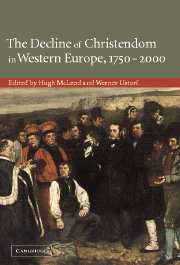Book contents
- Frontmatter
- Contents
- List of contributors
- Preface
- 1 Introduction
- Part I
- Part II
- 5 Established churches and the growth of religious pluralism: a case study of christianisation and secularisation in England since 1700
- 6 Catholicism in Ireland
- 7 Long-term religious developments in the Netherlands, c. 1750–2000
- 8 The potency of ‘Christendom’: the example of the Darmstädter Wort (1947)
- Part III
- Part IV
- Index of people and places
- Subject index
6 - Catholicism in Ireland
Published online by Cambridge University Press: 03 July 2009
- Frontmatter
- Contents
- List of contributors
- Preface
- 1 Introduction
- Part I
- Part II
- 5 Established churches and the growth of religious pluralism: a case study of christianisation and secularisation in England since 1700
- 6 Catholicism in Ireland
- 7 Long-term religious developments in the Netherlands, c. 1750–2000
- 8 The potency of ‘Christendom’: the example of the Darmstädter Wort (1947)
- Part III
- Part IV
- Index of people and places
- Subject index
Summary
Modern Ireland has appeared distinctive in two ways: first, in the complete identification of Irish nationalism with Irish Catholicism; and second, in the high levels of religious practice in Catholic Ireland until very recently, with over 90 per cent of the population attending mass every Sunday. Ireland has been unusual if not unique since the sixteenth century as a country in which the Counter-Reformation largely prevailed in the very teeth of persecution by a Protestant state, so that its Catholic faith was forged in the fire of suffering. Thus it has always been granted that in Ireland, at least from the time of Daniel O'Connell (1775–1847), Catholicism and Irish nationalism have reinforced each other. This relationship was sometimes troubled, and O'Connell himself drew the line against papal interventions in Irish politics by declaring ‘Our religion from Rome: our politics from home’, while the Irish Catholic nationalist movement was liberal in its sympathies in honouring its Protestant leaders, like the main protagonist of Home Rule for Ireland, Charles Stewart Parnell. Yet by drawing the priesthood into politics in the 1820s as the instruments of the first mass democratic movement in the modern world, the Catholic Association, O'Connell gave the clergy a perilous responsibility as the guardians of his pacific constitutionalist and democratic nationalism with its overt hostility to violence. Thus most churchmen suspected Irish nationalism in its revolutionary form, and they publicly denounced the main revolutions against British Protestant rule in Ireland in 1798, 1848 and 1867.
- Type
- Chapter
- Information
- The Decline of Christendom in Western Europe, 1750–2000 , pp. 99 - 112Publisher: Cambridge University PressPrint publication year: 2003
- 3
- Cited by



